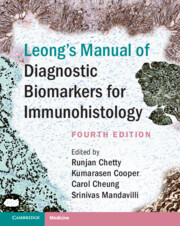Book contents
- Leong’s Manual of Diagnostic Biomarkers for Immunohistology
- Leong’s Manual of Diagnostic Biomarkers for Immunohistology
- Copyright page
- Dedication
- Contents
- Contributors
- Preface
- Dictionary
- Dictionary
- Dictionary
- Dictionary
- Dictionary
- Dictionary
- Dictionary
- Dictionary
- Dictionary
- Dictionary
- Dictionary
- Dictionary
- Dictionary
- Dictionary
- Dictionary
- Dictionary
- Dictionary
- Dictionary
- Dictionary
- Dictionary
- Plate Section (PDF Only)
- References
Dictionary
Published online by Cambridge University Press: 03 July 2022
- Leong’s Manual of Diagnostic Biomarkers for Immunohistology
- Leong’s Manual of Diagnostic Biomarkers for Immunohistology
- Copyright page
- Dedication
- Contents
- Contributors
- Preface
- Dictionary
- Dictionary
- Dictionary
- Dictionary
- Dictionary
- Dictionary
- Dictionary
- Dictionary
- Dictionary
- Dictionary
- Dictionary
- Dictionary
- Dictionary
- Dictionary
- Dictionary
- Dictionary
- Dictionary
- Dictionary
- Dictionary
- Dictionary
- Plate Section (PDF Only)
- References
- Type
- Chapter
- Information
- Leong's Manual of Diagnostic Biomarkers for Immunohistology , pp. 191 - 202Publisher: Cambridge University PressPrint publication year: 2022



